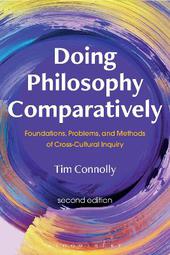
|
Doing Philosophy Comparatively: Foundations, Problems, and Methods of Cross-Cultural Inquiry
Paperback / softback
Main Details
| Title |
Doing Philosophy Comparatively: Foundations, Problems, and Methods of Cross-Cultural Inquiry
|
| Authors and Contributors |
By (author) Tim Connolly
|
| Physical Properties |
| Format:Paperback / softback | | Pages:312 | | Dimensions(mm): Height 234,Width 156 |
|
| Category/Genre | Non-western philosophy
Oriental and Indian philosophy
Comparative religion |
|---|
| ISBN/Barcode |
9781350177543
|
| Classifications | Dewey:109 |
|---|
| Audience | | Tertiary Education (US: College) | |
|---|
| Edition |
2nd edition
|
|
Publishing Details |
| Publisher |
Bloomsbury Publishing PLC
|
| Imprint |
Bloomsbury Academic
|
| NZ Release Date |
23 March 2023 |
| Publication Country |
United Kingdom
|
Description
What standards should we use to evaluate culturally distinct philosophies? What kind of barrier does language or cultural difference pose in our attempts to understand other traditions? How do we avoid our comparisons being biased? Doing Philosophy Comparatively answers these questions by providing a thorough overview of the methodology involved in extending philosophy across linguistic and cultural boundaries. Now revised and updated to showcase the most recent developments in the field, this second edition engages with philosophies beyond the Anglo-European tradition and features: * Examples of cross-cultural philosophy from a wider range of non-Western traditions * Methodological innovations from works of comparative philosophy published in the last decade * Focused exercises for each chapter demonstrating how to interact meaningfully with primary texts and engage with recent debates in comparative philosophy * Updated discussion questions and readings Introducing the main problems, methods, and approaches of comparative philosophy, this new edition shows you how to make informed cross-cultural judgments through reflection and practice. It remains an essential toolkit for the practice of doing comparative philosophy.
Author Biography
Tim Connolly is Professor of the Department of Modern Languages, Philosophy, and Religion at East Stroudsburg University, USA.
ReviewsAn excellent starting point for anyone interested in the field of comparative philosophy [...] Tim Connolly has established a benchmark for the study of comparative philosophy [...] by offering a clear summary of the key issues and by providing a platform for nurturing future philosophers to think beyond their localized perspectives. * OCCT Review (of the first edition) * The author faces the topics [in this book] in a concise but thought-provoking manner ... outlines the discipline in an exciting way ... [A] vibrant introduction to comparative philosophy. * Journal of East-West Thought (of the first edition) * In this well-written, jargon-free textbook, Connolly sensitively addresses the worthiness and significance of comparative philosophy while also acknowledging the difficulties that arise from a comparative approach [...] Each of the 11 chapters concludes with rich suggested readings and discussion questions that will serve well in classroom settings. This volume marks an extraordinary step forward in comparative philosophy, and this reviewer knows of no better guidebook. An invaluable resource for those pursuing a career in comparative philosophy. Summing Up: Highly recommended. * CHOICE (of the first edition) * This book's well-argued defense of comparative philosophy and illuminating discussions of its challenges and problems, as well as different comparative approaches, will provide invaluable resources for teaching and learning how to philosophize across cultural boundaries. Students will find the chapter-by-chapter exercises added to this new edition particularly helpful. * Sor-hoon Tan, Professor of Philosophy, Singapore Management University, Singapore * This book's lucid organization, engaging and accessible prose, and balanced presentation of competing views makes it the ideal introduction to comparative philosophy. * Stephen C. Angle, Professor of Philosophy, Wesleyan University, USA * An excellent introduction to comparative philosophy, but it also serves as a wonderful pedagogical tool for a research and methods course. The text is clear, well-organized, and most importantly philosophically interesting. * Cameron Brewer, Associate Professor of Philosophy, Central Connecticut State University, USA *
|